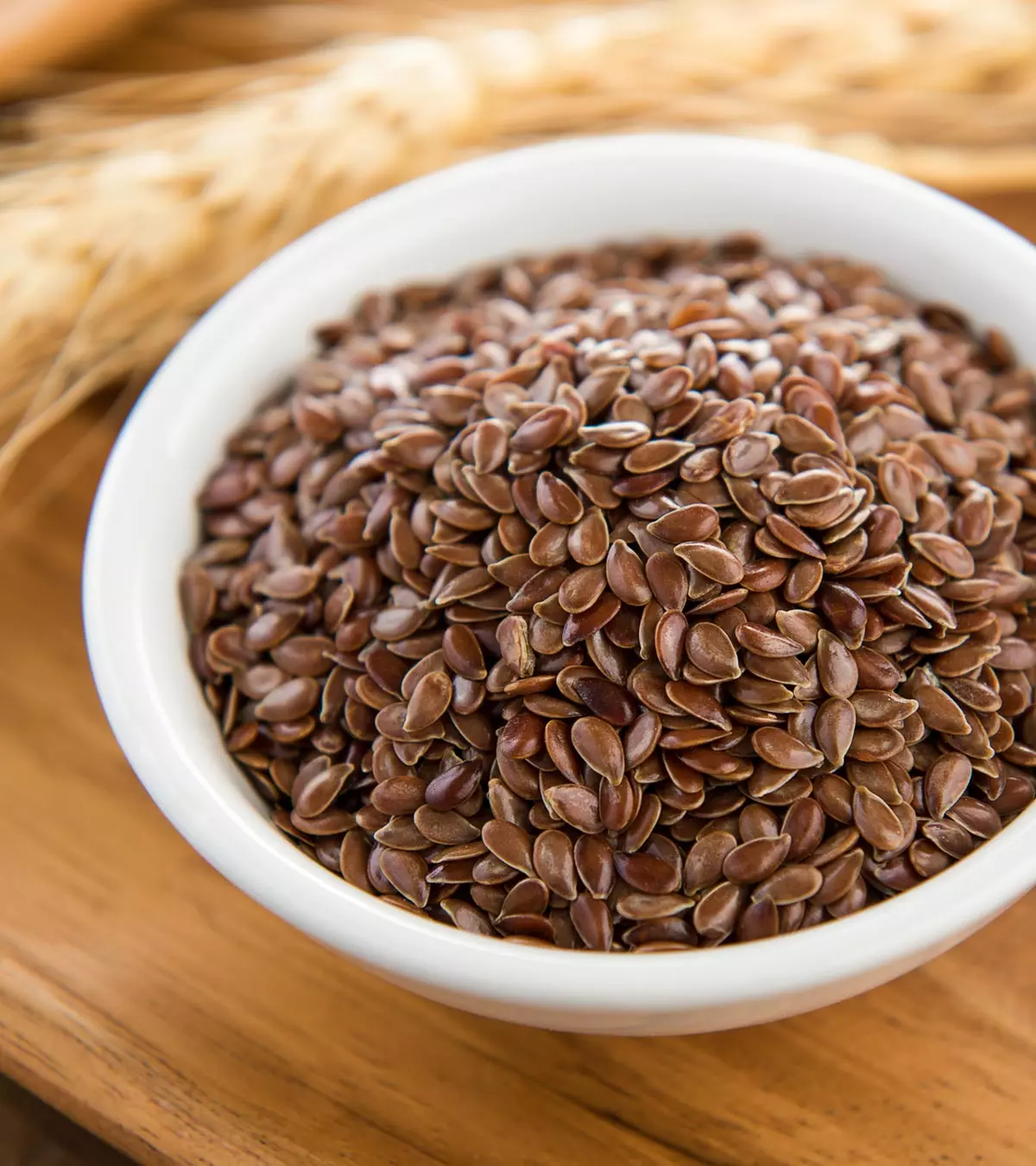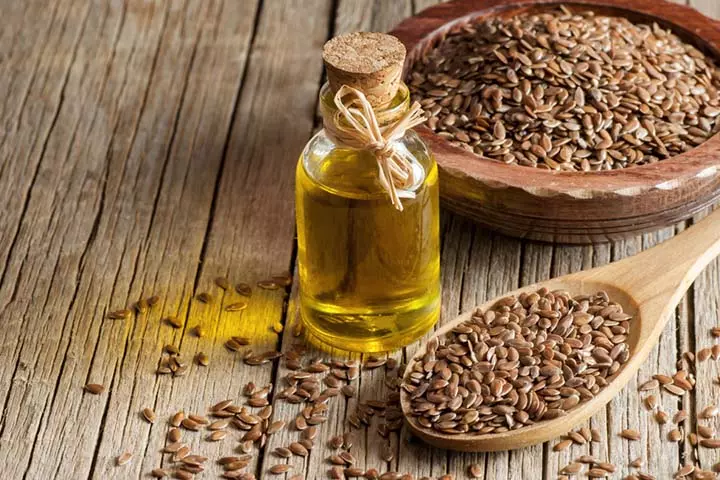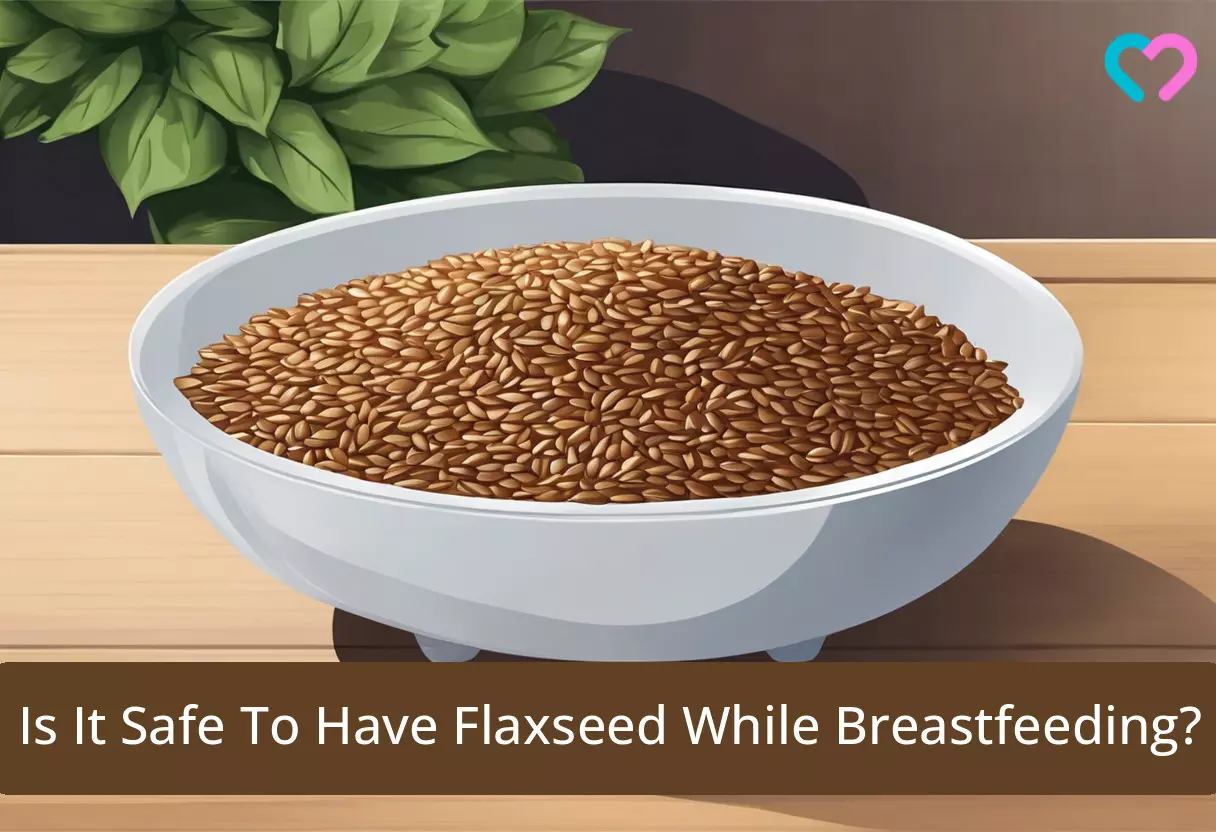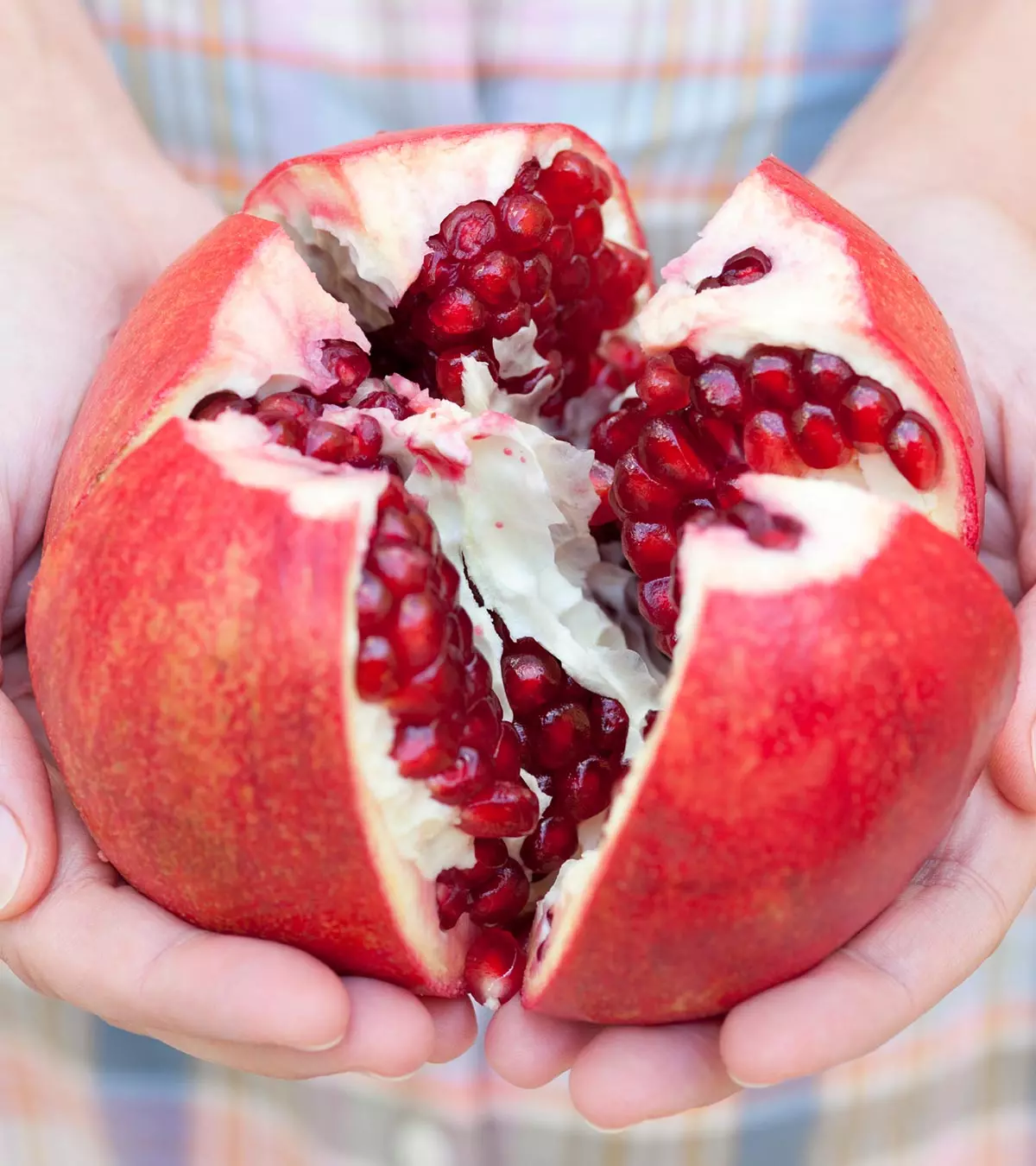
Image: Shutterstock
When you’re breastfeeding, you should keep eating healthy. This is because the food you eat can alter the supply and composition of your breast milk and aid your recovery after birth.

It is considered healthy to consume flaxseed while breastfeeding. Flaxseed is also known as linseed and is high in omega-3 fatty acids, fiber, and bioactive plant components.
This post discusses the safety of flaxseed during breastfeeding, its health advantages, and ways to incorporate it into your diet.
Key Pointers
- Though lactating mothers use flaxseeds to increase milk supply, its efficacy is not scientifically established.
- Flaxseeds contain calcium, magnesium, and zinc, among other required nutrients during breastfeeding.
- They should be consumed with caution by nursing mothers if they have stomach disorders and when taking other medications or dietary supplements.
Is Flaxseed Safe For Breastfeeding Mothers?

According to obstetrician and gynecologist Dr. Himali Maniar Patel, “Flaxseeds are generally considered safe for breastfeeding mothers. They are rich in omega-3 fatty acids, which are important for both mother and baby’s health. However, individual responses can vary, and some babies might have sensitivities to these seeds, leading to digestive issues. It’s important to monitor your baby for stool consistency or frequency changes.”
Consumption of flaxseed is well-tolerated in adults. Its safety and efficacy during lactation are not well researched (1), but it is considered safe to have them in small quantities. Consult a healthcare provider to know the amount of flaxseed you can consume. Medical consultation is important if you are considering dietary supplements or herbal supplements containing flaxseed oil.
Can Flaxseed Increase Breast Milk Supply?
There is an anecdotal belief that omega-3 fatty acids and phytoestrogensiBioactive compounds found in plants that may either inhibit or carry out the functions of estrogen. found in flaxseed can increase breast milk supply. It is why flaxseeds are among the foods that increase breast milk. While several lactating mothers use flaxseed as lactogenic food, there is no clinical indication of its use to regulate (increase or decrease) breast milk production. However, their intake in moderate amounts, with a well-balanced diet, can provide some health benefits.
Possible Health Benefits Of Flaxseed When Breastfeeding
Here are some benefits of consuming flaxseeds.
- Supply of nutrients: One tablespoon (10g) of flaxseed seed provides 1.8g of protein. The seed also contains essential micronutrients, such as magnesium, calcium, potassium, phosphorus, zinc, copper, and selenium (2).
- Source of DHA and EPA: Flaxseeds contain ALA (alpha-linolenic acid), one of the essential polyunsaturated fatty acids, which our body converts into DHA (docosahexaenoic acid) and EPA (eicosapentaenoic acid). Nursing mothers and their breastfed infants need essential fatty acids to perform various body functions important for growth, development, and sustainment (3).
- Essential fiber: The non-absorbable fiber found in flaxseeds helps keep constipation away. The fiber acts as a prebiotic for gut bacteria, boosts intestinal health, and in the long run, helps in weight management, too (4).
- Antioxidant effects: Flaxseeds are a good source of secoisolariciresinol diglucoside (SDG) and lignans that have potential antioxidant effects (5). Antioxidants are essential to combat oxidative damage that occurs due to free radicals.
- Anti-inflammatory properties: Research shows that flaxseed products, such as flaxseed oil, have anti-inflammatory, antipyretic, and analgesic properties (6) (7). Hence, it may help speed up postpartum recovery. Its topical use as a poultice to relieve inflammation and soreness in conditions like osteoarthritisiA form of arthritis that only impacts the joints causing inflammation and pain. is also documented (1) (8).

- Overall health benefits: Regular consumption of flaxseed with a well-balanced diet may help control blood sugar level, improve cholesterol levels, lower blood pressure, and improve heart health (9) (10) (11). Most of these flaxseed benefits are due to the presence of omega-3 fatty acids, insoluble fiber, and bioactive plant compounds, like lignans.
Besides these benefits, flaxseeds may help in treating health issues, such as bladder inflammation, vaginitis, and gastritis (12).
Precautions To Take While Consuming Flaxseed
Flaxseed should be consumed in moderation and with plenty of water as it could worsen constipation. Follow these precautions to avoid any possible side effects of the dietary intake of flaxseed (12).
- Flaxseed is not a common allergenic food, yet some allergic reactions to flaxseed and flaxseed oil have been documented. Check for possible reactions if you are planning to include it in any form for the first time.
- Avoid flaxseed if you have a gastrointestinal stricture or acute inflammation of the intestine, stomach, or stomach entrance.

- Avoid using flaxseed immediately after taking medicine, as it can delay the absorption time for certain medications.
- Breastfeeding mothers with any bleeding disorders or those on blood thinners should avoid flaxseed as it might slow blood clotting.
- Exercise caution when using flaxseed along with omega-3 supplements, as too much omega-3 can increase the risk of bleeding (13).
- Flaxseed contains phytic acid, an anti-nutrient that may reduce the absorption of micronutrients such as zinc and iron (14) (15). Therefore, excess intake of flaxseed must be avoided.
- Lactating mothers on medications for diabetes and blood pressure (high or low) should consult a doctor before starting the consumption of flaxseeds as they are known to have anti-diabetic and hypotensive effects.
- Avoid consuming partially defatted flaxseed meal as it might increase triglyceride levels in individuals suffering from high triglyceride levels.
- Those with a history of thyroid problems must consult a doctor before ingesting ground flaxseed, flaxseed oil, and supplements (16).
 Quick tip
Quick tipWays To Include Flaxseed In Your Breastfeeding Diet
Once your doctor permits you to consume flaxseed, you can explore various flaxseed products. Flaxseed makes for a great egg replacement when baking. Follow the ratio of one tablespoon of flaxseed to three tablespoons of water for each egg you wish to replace.
- Flax milk is considered an alternative to animal milk as it is cholesterol and lactose-free. This unique property also makes it suitable for people allergic to soy, nuts, and gluten.
- Add roasted flaxseed in cereals, porridge, soups, smoothies, and shakes. It can be added to bread or pancakes, as well.
Autumn, a mom of one, shares how she includes flaxseed in her nursing diet. She notes, “All nuts and seeds are great for nursing because they offer great nutrients for you and your little one. Flaxseed is great because it has no flavor (at least, I don’t think so). I put it in smoothies, oatmeal, yogurt, and cereal (i).”
- Cold-pressed organic flaxseed oil is a great addition to salad dressings, dips, and sauces.
- Mothers can add these seeds to their lactation food recipes.

You can also prepare a customized seed and nut trail mix with flaxseeds. Do consult a lactation expert to know the safe intake amount of the various nuts used.
 Did you know?
Did you know?Frequently Asked Questions
1. How does flaxseed help breast milk?
The increased omega-3 fatty acids in breast milk may benefit the breastfed baby (17). A marked increase in breastmilk’s alpha-linolenic acid (ALA) content and a slight increase in eicosapentaenoic acid (EPA ) were found when flaxseed oil was given as a supplement to lactating women. However, there was no increase in docosahexaenoic acid (DHA) content.
2. Is flaxseed oil safe for breastfed babies?
Maternal consumption of flaxseed oil in appropriate doses has not been shown to cause any harm to breastfed babies (17). Consult a doctor to know the suitable dose for you.
3. Who should not take flaxseed oil?
Women with a history of bowel disorders, narrowed esophagus, uterine, and ovarian cancer, or endometriosisiWhen the uterine lining develops outside the uterus. should consult a doctor before starting flaxseed or its products. Raw or unripe flaxseed should not be eaten as it may cause toxicity (18).
4. Can flaxseed help with postpartum depression?
Omega-3 fatty acids have been found beneficial in reducing postpartum depression (20). Flaxseeds, a rich source of omega-3 fatty acids, may help with the condition.
5. Can flaxseed help with reducing inflammation in breastfeeding mothers?
Flaxseed has been reported to contain many anti-inflammatory bioactive agents and may help reduce inflammation in breastfeeding mothers (21).
6. Can flaxseed help reduce breast cancer risk in breastfeeding mothers?
Some studies note that the alpha-linolenic acids found in flaxseeds may help suppress cancer cells’ growth, size, and proliferation. Other animal studies found that flaxseed intake may improve the effects of anticancer drugs such as tamoxifen (22).
7. Can flaxseed help reduce the risk of osteoporosis in breastfeeding mothers?
Animal studies have shown that flaxseeds may help reduce the risk of osteoporosis by improving bone mineral density (23).
8. What are the signs of flaxseed allergy in infants?
If your baby has a flaxseed allergy, they may show signs such as a rash, hives, swelling, or vomiting (24). After introducing flaxseed to your infant’s diet, watch them closely for any allergic reactions. If you notice any of these symptoms, consult your pediatrician for advice.
Most nursing mothers wonder if they may consume flaxseed while breastfeeding to boost their milk supply. However, there is no proper research backing this fact. Nevertheless, flaxseeds are rich in fiber and offer several health benefits to a breastfeeding mom. These seeds have an anti-inflammatory nature and are packed with vital nutrients. Hence, incorporating them into your regular, well-balanced diet can supplement your maternal nutrition and aid your infant’s health. However, you must speak to your doctor before including flaxseed in your nursing diet, especially if you are on supplements or other medications.
Infographic: Flaxseed Recipes For Breastfeeding Mothers
Now that you have read about the benefits of including flaxseeds in your diet while breastfeeding, you might be wondering what recipes you can include them in. We have got you covered. The following infographic contains a list of flaxseed recipes that are easy to make and also a tasty treat to indulge in from time to time.
Some thing wrong with infographic shortcode. please verify shortcode syntax
Illustration: Is It Safe To Have Flaxseed While Breastfeeding?

Image: Stable Diffusion/MomJunction Design Team
Personal Experience: Source
MomJunction articles include first-hand experiences to provide you with better insights through real-life narratives. Here are the sources of personal accounts referenced in this article.
i. How to boost your milk supply;https://autumnmablemomblog.wordpress.com/2016/02/15/how-to-boost-your-milk-supply/
References
1. Flaxseed; Drug and lactation database; NCBI
2. Seeds, flaxseed, FDC ID: 169414; Fooddata Central; USDA
3. Omega-3 Fatty Acids; National Institute of Health; U.S Department of Health and Human Services
4. Flaxseed fiber ferments in gut to improve health, reduce obesity; Science Direct
5. Mihir Parikh et al.; Dietary Flaxseed as a Strategy for Improving Human Health; NCBI
6. Gaurav Kaithwas et al.; Anti-inflammatory, Analgesic and Antipyretic Activities of Linum Usitatissimum L. (Flaxseed/Linseed) Fixed Oil; NCBI
7. Guan-Yu Ren et al.; Effect of Flaxseed Intervention on Inflammatory Marker C-Reactive Protein: A Systematic Review and Meta-Analysis of Randomized Controlled Trials; NCBI
8. Burcu Babadağ Savaş et al.; Effect of Flaxseed Poultice Compress Application on Pain and Hand Functions of Patients With Hand Osteoarthritis; NCBI
9. Delfin Rodriguez-Leyva et al.; The cardiovascular effects of flaxseed and its omega-3 fatty acid, alpha-linolenic acid; NCBI
10. Kailash Prasad and Arti Dhar; Flaxseed and Diabetes; NCBI
11. Deysla SabinoGuarda et al.; Flaxseed oil during lactation changes milk and body composition in male and female suckling pups rats; ScienceDirect
12. Flaxseed; University of Rochester
13. Omega-3 Fatty Acids; National Library of Medicine
14. B. Dave Oomah et al.; Phytic Acid Content of Flaxseed As Influenced by Cultivar, Growing Season, and Location; NCBI
15. Raj Kishor Gupta et al.; Reduction of phytic acid and enhancement of bioavailable micronutrients in food grains; NCBI
16. Carie E. Shealy, Flaxseed oil; University of Colorado Denver
17. Flaxseed. https://www.ncbi.nlm.nih.gov/books/NBK501895/
18. Flaxseed. https://www.mountsinai.org/health-library/herb/flaxseed
19. Flax: What You Need to Know. https://badgut.org/information-centre/a-z-digestive-topics/flax-what-you-need-to-know/
20. Mi-Mi Zhang et al.; The efficacy and safety of omega-3 fatty acids on depressive symptoms in perinatal women: a meta-analysis of randomized placebo-controlled trials; NCBI
21. Leila Zarepoor et al.; Dietary flaxseed intake exacerbates acute colonic mucosal injury and inflammation induced by dextran sodium sulfate; NCBI
22. Ana Calado et al.; The Effect of Flaxseed in Breast Cancer: A Literature Review; NCBI
23. Eman Ragheb; The Potential Effect of Flax Seeds Against Osteoporosis in Experimental Female Rats; NCBI
24. Andrew O’Keefe et al.; Flax seed allergy in children: an emerging allergen?; NCBI
Community Experiences
Join the conversation and become a part of our nurturing community! Share your stories, experiences, and insights to connect with fellow parents.
Read full bio of Yinés Garcia-Taylor
- Dr. Himali M Patel is an Ahmedabad, India based gynecologist with 13 years of experience. She currently practices at Nisha Women's Hospital and IVF Centre. Dr. Patel did her graduation in Medicine at Bharati Vidyapeeth University, Pune and holds a diploma in Obstetrics and Gynecology.
 Dr. Himali M Patel is an Ahmedabad, India based gynecologist with 13 years of experience. She currently practices at Nisha Women's Hospital and IVF Centre. Dr. Patel did her graduation in Medicine at Bharati Vidyapeeth University, Pune and holds a diploma in Obstetrics and Gynecology.
Dr. Himali M Patel is an Ahmedabad, India based gynecologist with 13 years of experience. She currently practices at Nisha Women's Hospital and IVF Centre. Dr. Patel did her graduation in Medicine at Bharati Vidyapeeth University, Pune and holds a diploma in Obstetrics and Gynecology.
Read full bio of Swati Patwal
Read full bio of Rohit Garoo
Read full bio of Anindita Ghatak

















